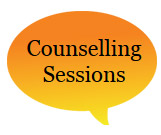Is it for me?
Here to help you! Evolve is a charity dedicated to removing the barriers to counselling by supporting everyone in the local community and surrounding counties with counselling sessions at affordable prices.
Evolve offers ANYONE 18 and over, of any gender, background, lifestyle and nationality, a confidential and caring environment in which to explore their issues. Counselling offers you the opportunity to be listened to and to explore how past events or current circumstances or thoughts about the future may be affecting your life.
The counsellor will not tell you what you should do, but will work with you to help you to find your own solutions. This may enable you to make positive changes and could be the turning point to leading a fuller and happier life.

How do I know what makes a good counsellor?
If you come to Evolve for counselling, always ensure that your counsellor is professionally qualified and registered with a recognised professional body. Look for accreditation with either Evolve, BACP, NCS, UKCP or equivalent to ensure that they are fully qualified and have the appropriate experience. Try to get a personal recommedation if you are at all unsure.
ALL Evolve counsellors are fully qualified and experienced, work to a minimum of BACP standards and codes of ethics, and undertake, regular ongoing training and DBS checks, so you can be sure you are in safe hands.
The Counselling Process...

Contact us yourself . You will speak to a reception counsellor who will provide any information you need.
Hunts & Cambs 01223 233047
Peterborough 01733 553166
If you decide to proceed with Evolve, we will take your telephone number and a Evolve counsellor will contact you, usually within a few days to arrange an assessment session. Sessions are usually weekly thereafter.

The initial assessment takes place with an experienced counsellor. They will explore with you your needs and expectations from counselling, and ensure that Evolve offers the best service for you.
We will tell you if there are other agencies or charities that might suit your needs better.

If you are a fee-paying client, you will be offered 13 sessions initially, with the opportunity for further sessions if needed, in exceptional circumstances.
To book your first session or to find out more, contact us
FAQs - General Frequently Asked Questions about Evolve
Careful listening is the largest part of what all counsellors do.
They make sure you have defined the problem areas in your own way and help you decide what you wish to do next.
Some will then be more proactive, offering suggestions for more exploration or beginning to resolve the problems; others are less so and let the work proceed more at your pace.
There are no hard and fast rules. If something is troubling you it can be worth spending some time thinking about why this may be happening. There are, however, a number of issues that frequently come up, for example:
Relationship difficulties: family and friends, colleagues, commitment, jealousy, abuse
Family issues: partners, children, parenting, separation and divorce
Lack of confidence: worried about failing, never being good enough, feeling judged
Depression: feeling isolated, lonely, empty, tearful, unloved, suicidal
Self-harming behaviours: binge eating, cutting, abusive relationships, alcohol, drugs
Bereavement: loss, anger, loneliness, sadness, depression
The counsellor can also direct you to other services that may be useful to you.
Nearly all of our clients report that they have found counselling useful to help them identify their problem and ways to cope with it so it seems to offer at least some help to the majority of people. It's not for everyone, but it's definitely worth a try.
At your initial assessment, your counsellor will discuss with you whether talking might be helpful for you – and if not, will help you to look for something else.
How long should I expect to have to continue Counselling?
The number of counselling sessions depends on you as an individual and what you are bringing to counselling. The assessment session will help you decide if counselling can help. Usually you will start with six sessions and review after that.
This is extremely rare due to the care taken by the receptionist counsellor to place you with a counsellor best suited. However, as a professional organisation, Evolve has processes and procedures which you will be made aware of at the reception stage, allowing you to move forward with confidence.
Because we have many different counsellors, if you are not happy with the counsellor you are seeing, simply contact reception and arrange to transfer to someone else. Your notes can be passed on so that you don't need to go over everything from the beginning.
Many people think that they are being strong in not seeking help whereas in fact those who can face up to their difficulties could be considered the strong ones.
Asking for counselling often means you have taken the first difficult step on the road to resolving the problem.
Evolve aims to provide affordable counselling that is accessible and fair to all. Evolve therefore operates on a sliding scale based on income which makes our counselling more accessible to people on lower incomes. Our reception counsellor is professionally trained and experienced and can discuss this with you in confidence.
As a minimum Evolve counsellors are required to provide evidence of having completed an approved course of training involving a minimum of 300 – 400 hours of continuous theory and skills over a period of three years. They also have to show that they have completed a minimum of150 hours of supervised practice during and after the training course.
We offer weekly sessions, however this can vary depending on the type of therapy and your personal needs. You can discuss this at your assessment session.
The assessment session offers you the opportunity to outline and consider the issues that are concerning you. The session also helps to clarify whether Evolve can offer the most appropriate form of counselling for you. If we can’t then we can offer advice as to where to go next.
Please contact us by phone or email to speak to our reception counsellor. They will then allocate you to a counsellor who will meet with you to carry out an assessment.
The number of counselling sessions depends on you as an individual and what you are bringing to the counselling. The assessment session will help you decide if counselling can help. Usually as a fee paying client, you will start with thirteen sessions.
Our counsellors work to a strict Code of Ethics which means they must inform you of the limits of confidentiality and then stick to these rules. This will be discussed with you at the assessment session.
An assessment session can last from between an hour and an hour and a half.
Each session usually lasts 50 minutes to an hour depending on the counsellor.
You can say whatever you like.
Sometimes there is silence; sometimes you might find yourself saying things you had not expected to say.
The counsellor will help you explore what is going on for you and will keep referring to you to clarify his/her understanding.
Having problems is part of being human. Many counsellors come into the work because of their experience of successfully resolving personal problems through therapy.
All Evolve counsellors will have had their own experience of being a client and facing their demons as part of their training.
Therefore, although the counsellor may not have experienced the particular problem which you bring, they will all have had experience of being in distress and of seeking counselling help from another.
Counsellors don't ever give advice like, "I'd leave your job if I was you." The purpose of counselling is to help you make your own decision.
They will never make a moral decision about the course of action you ought to take.
They may sum up what they understand you have been saying so far in order to help you move forward.
They can offer pointers to how others have successfully dealt with common problems and may also make suggestions such as, "I wonder if you have thought of ..."
These suggestions will be drawn from their training in what is helpful and their experience of what has helped others in the past. You can decide whether or not these suggestions are helpful to you.
